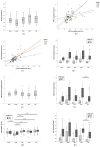Motor-Independent Cognitive Testing in Motor Degenerative Diseases
- PMID: 35160265
- PMCID: PMC8836999
- DOI: 10.3390/jcm11030814
Motor-Independent Cognitive Testing in Motor Degenerative Diseases
Abstract
Cognitive function is tested through speech- or writing-based neuropsychological instruments. The application and validity of those tests is impeded for patients with diseases that affect speech and hand motor skills. We therefore developed a "motor-free" gaze-controlled version of the Trail Making Test (TMT), including a calibration task to assess gaze accuracy, for completion by means of an eye-tracking computer system (ETCS). This electronic TMT version (eTMT) was evaluated for two paradigmatic "motor-neurodegenerative" diseases, Parkinson's disease (PD) and amyotrophic lateral sclerosis (ALS). We screened 146 subjects, of whom 44 were excluded, e.g., because of vision deficits. Patients were dichotomized into subgroups with less (ALS-, PD-) or severe motor affection (ALS+, PD+). All 66 patients and all 36 healthy controls (HC) completed the eTMT. Patients with sufficient hand motor control (ALS-, PD-, PD+) and all HC additionally completed the original paper-pencil-based version of the TMT. Sufficient and comparable gaze fixation accuracy across all groups and the correlations of the eTMT results with the TMT results supported the reliability and validity of the eTMT. PD+ patients made significantly more errors than HC in the eTMT-B. We hereby proved the good applicability of a motor-free cognitive test. Error rates could be a particularly sensitive marker of executive dysfunction.
Keywords: Parkinson’s disease; Trail Making Test; amyotrophic lateral sclerosis; cognition; executive functions; eye tracking; neuromuscular diseases; neuropsychological tests.
Conflict of interest statement
H.S.-P., K.L., E.A., M.L., A.S., and A.H. declare no conflict of interest. W.R. and M.J.’s affiliation “Interactive Minds” is a provider of ETCS in the region of Dresden. The funders had no role in the design of the study; in the collection, analyses, or interpretation of data; in the writing of the manuscript, or in the decision to publish the results.
Figures


References
-
- Keller J., Krimly A., Bauer L., Schulenburg S., Böhm S., Aho-Özhan H.E.A., Uttner I., Gorges M., Kassubek J., Pinkhardt E.H., et al. A first approach to a neuropsychological screen-ing tool using eye-tracking for bedside cognitive testing based on the Edinburgh Cognitive and Behavioural ALS Screen. Amyotroph. Lateral Scler. Front. Degener. 2017;18:443–450. doi: 10.1080/21678421.2017.1313869. - DOI - PubMed
LinkOut - more resources
Full Text Sources
Miscellaneous

